
Girls attend make-up training session at live streaming talent agency Three Minute TV in Beijing, China on April 12, 2017. The fastest-emerging internet sector barely existed in China three years ago but last year produced revenues of more than 30 billion yuan ($4.3 billion) and according to an estimate by investment bank China Renaissance Securities, is set to more than triple that by 2020. That puts it on track to overtake cinema box office receipts in a few year’s time. The rapid growth of live streaming in China has attracted a rush of investment, led by China’s tech heavyweights, Tencent Holdings, Alibaba Group Holding and Baidu Inc. They hope live streaming can boost existing services in e-commerce, social networking and gaming. Tencent, the country’s biggest online gaming and social networking company, is backing a slew of streaming and interactive entertainment firms, including gaming platform Douyu. Alibaba's Taobao marketplace launched a live-streaming platform early last year, allowing sellers to promote products directly to online viewers in real time. The lure is some 344 million Chinese netizens – more than the population of every country on the planet bar China and India – who were watching live streaming sites in December. And that is only about 47 percent of all Chinese Internet users. There are about 150 live streaming platforms, most producing entertainment shows. The importance of live streaming in lower-tier cities is greater than elsewhere in China. Access to the internet via a mobile phone is the major, if not the only, gateway to shopping and entertainment, said Karen Chan, equities analyst at Jefferies Hong Kong. Live streaming has also bolstered the growth of ancillary businesses, including agencies looking to find the next live streaming star, consumer loans, and even cosmetic surgery. Deng Jian, chairman of Three Minute TV, an agency that provides 1,000 trained anchors to more than three dozen platforms, said his business operates a “militarized” production machine to feed the live streaming industry. At an office building in a suburb of Beijing, dozens of Deng’s female anchors work each day around the clock in three shifts. Each anchor sits in a small booth, decorated to appear like a girl’s bedroom, facing a computer. They sing and flirt with fans, encouraging them to buy virtual gifts, like a rose, sportscar or villa. The cash for the gifts is split by the platforms, agencies and the anchor. Three Minute TV also arranges cosmetic surgery at partner hospitals for its anchors, arranges small bank loans for the surgery, photographs and markets the anchors and helps them find acting opportunities Deng said. In July, China's culture ministry announced that it had shut down 4,313 online show rooms, firing or punishing more than 18,000 anchors. Twelve platforms, including heavyweights Panda TV, 6.CN and Douyu, were punished and ordered to make changes after offering illicit content that “promotes obscenity, violence, abets crime and damages social morality”. Still, the prospect of change in the sector hasn’t faded the hopes of thousands of young Chinese who want to become internet stars. (Photo by Thomas Peter/Reuters)

A girl broadcasts at live streaming talent agency Three Minute TV in Beijing, China on April 12, 2017. (Photo by Damir Sagolj/Reuters)

A girl broadcasts at live streaming talent agency Three Minute TV in Beijing, China on April 12, 2017. Three Minute TV also arranges cosmetic surgery at partner hospitals for its anchors, arranges small bank loans for the surgery, photographs and markets the anchors and helps them find acting opportunities Deng said. (Photo by Damir Sagolj/Reuters)
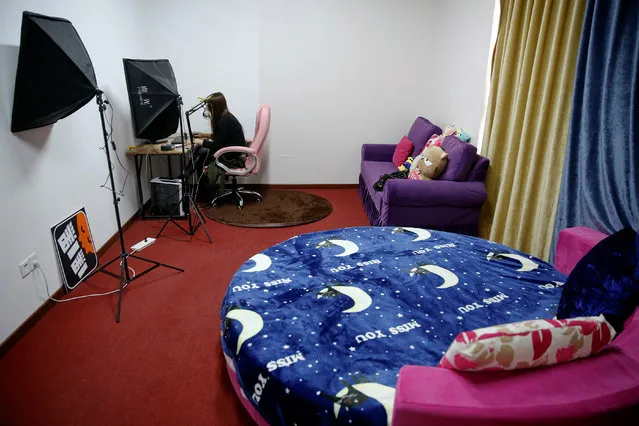
A girl broadcasts at live streaming talent agency Three Minute TV in Beijing, China on April 12, 2017. (Photo by Damir Sagolj/Reuters)
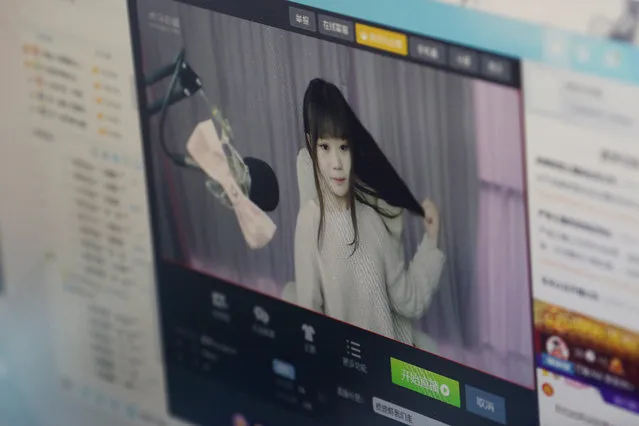
A girl broadcasts at Three Minute TV, a live streaming talent agency in Beijing, China on April 12, 2017. (Photo by Thomas Peter/Reuters)

Girls attend make-up training session at live streaming talent agency Three Minute TV, in Beijing, China on April 12, 2017. (Photo by Thomas Peter/Reuters)

A girl carries a small dog in her bag as she walks inside a dormitory housing broadcasts of live streaming talent agency Three Minute TV in Beijing, China on April 12, 2017. (Photo by Damir Sagolj/Reuters)
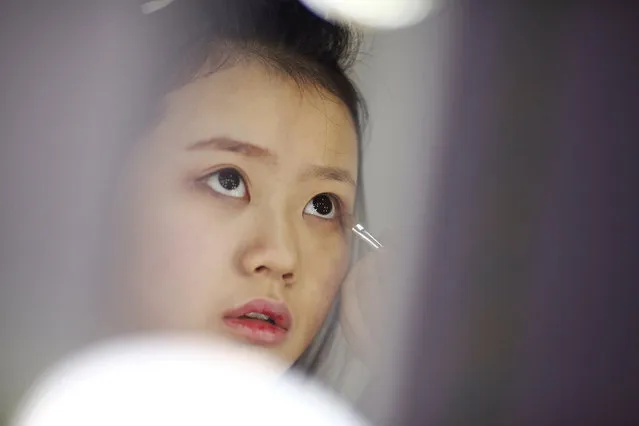
A girl attends make-up training session at live streaming talent agency Three Minute TV in Beijing, China on April 12, 2017. (Photo by Thomas Peter/Reuters)
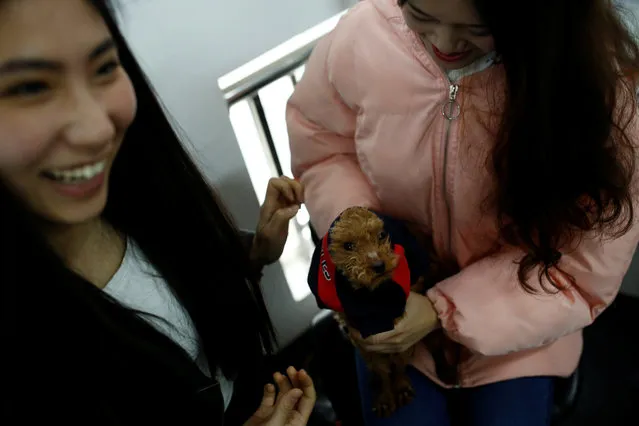
Girls play with a dog at live streaming talent agency Three Minute TV in Beijing, China on April 12, 2017. (Photo by Thomas Peter/Reuters)

A stuffed toy is seen at live streaming talent agency Three Minute TV, in Beijing, China on April 12, 2017. (Photo by Thomas Peter/Reuters)

Girls attend make-up training session at live streaming talent agency Three Minute TV in Beijing, China on April 12, 2017. (Photo by Thomas Peter/Reuters)
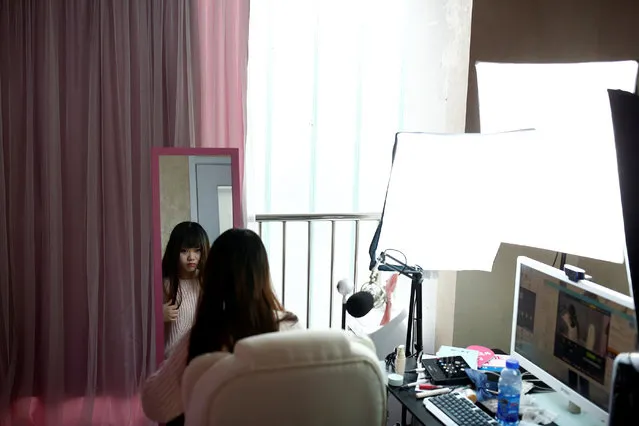
A girl broadcasts at a live streaming talent agency Three Minute TV in Beijing, China on April 12, 2017. (Photo by Thomas Peter/Reuters)

A girl attends make-up training session at live streaming talent agency Three Minute TV in Beijing, China on April 12, 2017. (Photo by Thomas Peter/Reuters)

A girl broadcasts at live streaming talent agency Three Minute TV in Beijing, China on April 12, 2017. (Photo by Damir Sagolj/Reuters)

Girls attend make-up training session at live streaming talent agency Three Minute TV in Beijing, China on April 12, 2017. (Photo by Thomas Peter/Reuters)
16 Apr 2017 10:43:00,
post received
0 comments
